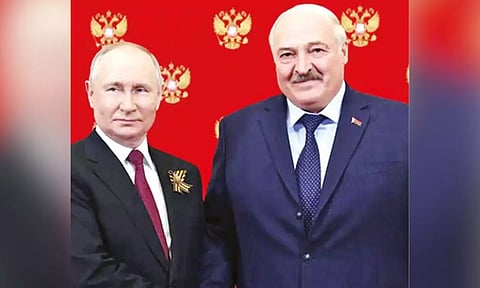

GRZEGORZ SZYMANOWSKI
He wanted to go all the way to Moscow but has likely ended up in Minsk instead. Fighters from the infamous Russian private military company the Wagner Group were already on their way to the capital when news came from the government in Belarus. “Wagner Group boss Yevgeny Prigozhin accepted the proposal of the president of Belarus, Alexander Lukashenko, to stop the movement of armed personnel of the Wagner company inside Russia, and take additional steps to de-escalate tensions,” the official statement said.
Prigozhin’s whereabouts are currently unknown but he reportedly left Russia for Belarus, with his departure marking the end of his rebellion. It would appear that Belarusian leader Lukashenko saved Russian President Vladimir Putin from domestic destabilization in the middle of Russia’s war on Ukraine. The Kremlin was grateful to Lukashenko for his efforts, its spokesman Dmitry Peskov said. A commentator on Russian television was more effusive, saying that Lukashenko “deserves a monument in the nicest part of Moscow.” But how exactly did this surprising turn of events come about — and what role will Belarus play in the near future?
A threat to power in Minsk
Over the course of the revolt, it became clear that Lukashenko would stand by Putin’s side. The two heads of state had spoken on the phone at least twice. Lukashenko is said to have offered to work as a mediator because he’s known Prigozhin personally for 20 years, sources in the Kremlin said. At the same time, the Belarusian Security Council said that Belarus would remain Russia’s ally and that any conflict within Russia would be a gift to the West.
“Lukashenko has an interest in preventing a major crisis in Russia,” said Yauheni Preiherman, director of the think tank, the Minsk Dialogue Council on International Relations. The big concern for the government in Minsk is that fighting in Ukraine could spread to Belarusian territory, he told DW. This fear appears to be warranted, as evidenced by the appeal launched by Lukashenko opponents from the Kalinouski Regiment, which consists of Belarusian volunteers fighting on the side of the Ukrainian army against Russia. While Prigozhin was still conducting his mutiny, the regiment declared in a video that they were ready to seize the opportunity and “liberate Belarus from dictatorship and occupation.” “Lukashenko’s interest is to prevent such a thing from happening,” Preiherman said.
Since 1999, Belarus and Russia have been linked in the so-called “Union State of Russia and Belarus” that’s based on a treaty from 1997. But Lukashenko has tried to maintain a degree of autonomy from Putin in the past. “Their relationship has always been quite turbulent and has seen many ups and downs,” Preiherman noted.
But Lukashenko has been more reliant on Putin since the summer of 2020, perhaps even earlier. Back then, after rigged presidential elections, Lukashenko faced massive popular protests. Thousands demanded his resignation. But the Kremlin stood by Lukashenko with loans and the announcement of a possible intervention. Lukashenko brutally crushed the democratic protests, whose leaders were arrested or forced into exile. But now Putin and Lukashenko have switched roles, so to speak, observes Belarusian human rights activist Olga Karach, head of the Belarusian civil society initiative, Our House.
This article was provided by Deutsche Welle